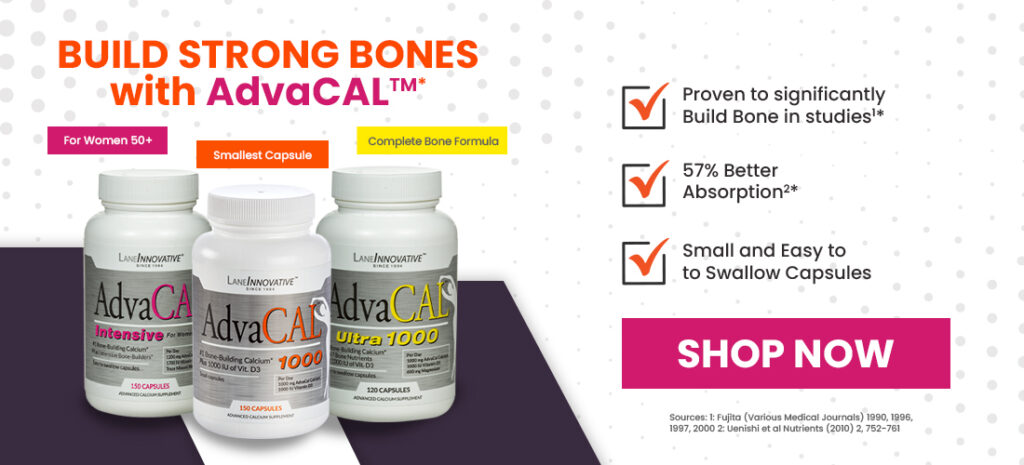Bone Health
Calcium Absorption and Proton Pump Inhibitors: Essential Facts for Stronger Bones
Calcium is one of the most important minerals in the body and calcium absorption is crucial for bone health. It keeps bones strong, supports muscles, helps nerves carry signals, and plays a role in blood clotting and heart rhythm. But simply taking calcium doesn’t guarantee your body will absorb and use it effectively. One of the key factors that affects calcium absorption is stomach acid.
For people who use proton pump inhibitors (PPIs)—medications that reduce stomach acid—this can make a real difference. Magnesium absorption is also influenced by stomach acid, which means both minerals may be affected at the same time. Let’s look at how this works, what characteristics make some calcium supplements easier to absorb than others, and what else you can do to support healthy bones and minerals.

How Stomach Acid Affects Calcium Absorption & Magnesium Absorption
Stomach acid plays a critical role in digestion. It doesn’t just help break down food — it also helps release minerals into a form your body can actually use.
- Calcium usually begins in a form that doesn’t dissolve well in water. Stomach acid breaks it down into tiny charged particles that can be absorbed in the small intestine. When acid is reduced — as happens with long-term PPI use — less calcium is broken down, and calcium absorption is reduced.
- Magnesium works in a similar way. A less acidic environment makes it harder for the body to transport magnesium across the gut wall. Over time, some people using PPIs develop low magnesium levels, which can affect muscles, nerves, and bone health.
- Secondary effects: Research has shown that when calcium absorption is reduced, the body may increase parathyroid hormone (PTH) levels to keep blood calcium steady. Over time, this compensation can raise bone turnover and contribute to fracture risk. Long-term use of PPIs has been linked to this effect in multiple studies and reviews (Ito & Jensen, 2010).
What Makes Some Calcium Supplements More Ideal for Calcium Absorption
Not all calcium supplements are absorbed equally well. The difference usually comes down to three simple things:
- How easily it dissolves
Calcium that breaks down quickly in fluid is easier for your body to use. If it doesn’t dissolve well, much of it may just pass through your system unused. - How much it relies on acid
Some calcium supplements need strong stomach acid to unlock the mineral. Others are less dependent on acid, so they’re more consistent even if acid levels are low. - The balance between “amount” and “usability”
A supplement might advertise a high number of milligrams, but if it doesn’t dissolve or absorb well, you may not get much benefit. Sometimes a supplement with a slightly lower amount that’s more usable in the body is the better choice.
What is a High-Absorbing Calcium?
- Dissolves easily so your body can use it
- Works even when stomach acid is low
- Balanced for better overall absorption
When selecting a calcium supplement, look for one with the characteristics of a high-absorbing calcium — one that dissolves easily, isn’t overly dependent on strong stomach acid, and balances calcium content with good usability.
Beyond Supplements: Other Factors That Influence Calcium Absorption
While choosing a supplement with the right characteristics is important, it’s only part of the picture. Other factors also affect how well your body uses calcium.
- Vitamin D
Vitamin D plays a central role in calcium absorption. Without enough vitamin D, even the best calcium source won’t be absorbed efficiently. Spending time in sunlight, eating vitamin D-rich foods like fatty fish, or consuming fortified foods can help maintain healthy levels.
- Age and Stomach Acid Decline
Stomach acid naturally declines as we get older — even without medications like PPIs. That means older adults often absorb calcium less efficiently. Understanding this can help explain why paying attention to calcium type and diet is especially important with age.
3. Magnesium Matters Too
Magnesium and calcium often work together. Magnesium is not only important for bones but also supports muscles and nerve signaling. Since PPIs can also reduce magnesium absorption, it’s smart to keep magnesium-rich foods (nuts, seeds, leafy greens, legumes) in your diet.
- Food Sources of Calcium
Calcium from food is still a cornerstone of bone health. Dairy products, fortified plant milks, sardines, almonds, kale, and broccoli are all good examples. Keep in mind that some foods high in oxalates (like spinach) provide calcium, but the mineral isn’t absorbed as well compared to other leafy greens.
- Lifestyle Factors
Strong bones aren’t just about minerals. Weight-bearing exercise, getting enough protein, avoiding smoking, and limiting alcohol all contribute to healthier bones and better calcium use in the body.
Tips for Choosing Calcium Wisely
If you’re taking PPIs or know your stomach acid is low, keep these points in mind:
- Choose calcium that dissolves easily and isn’t heavily dependent on acid.
- Don’t assume the highest milligrams on the label equals best absorption. Usability matters just as much as the amount.
- Split your intake into smaller servings during the day instead of one large dose. Your body can only absorb a limited amount of calcium at one time.
- Take calcium with meals. Even if acid is reduced, digestion during meals still helps the body absorb nutrients more efficiently.
- Support absorption with a healthy lifestyle: make sure you get enough vitamin D, magnesium, and regular exercise.
- Above all, aim for a calcium that has the characteristics of a high-absorbing calcium — dissolves well, works under low-acid conditions, and provides a balance of usable calcium for your body.
Final Thoughts
Proton pump inhibitors are widely used to reduce stomach acid, but one side effect is reduced absorption of important minerals like calcium and magnesium. Over time, this can affect bone health. Understanding the characteristics that make calcium absorption more ideal can help you make better choices and protect your bones.
Remember, it’s not always about the number on the supplement label — it’s about how well your body can use it. Pairing good calcium choices with vitamin D, magnesium, healthy food sources, and weight-bearing exercise gives your bones the strongest possible foundation.
References
- NIH Office of Dietary Supplements. Calcium – Health Professional Fact Sheet. Updated July 11, 2025.
- Florentin M, et al. Proton pump inhibitor-induced hypomagnesemia: A new clinical challenge. World J Nephrol. 2012.
- Ito T, Jensen RT. Association of long-term PPI therapy with bone fractures and effects on absorption of calcium, vitamin B12, iron, and magnesium. Curr Gastroenterol Rep. 2010;12(6):448–57
Like? Share with Your Friends!

